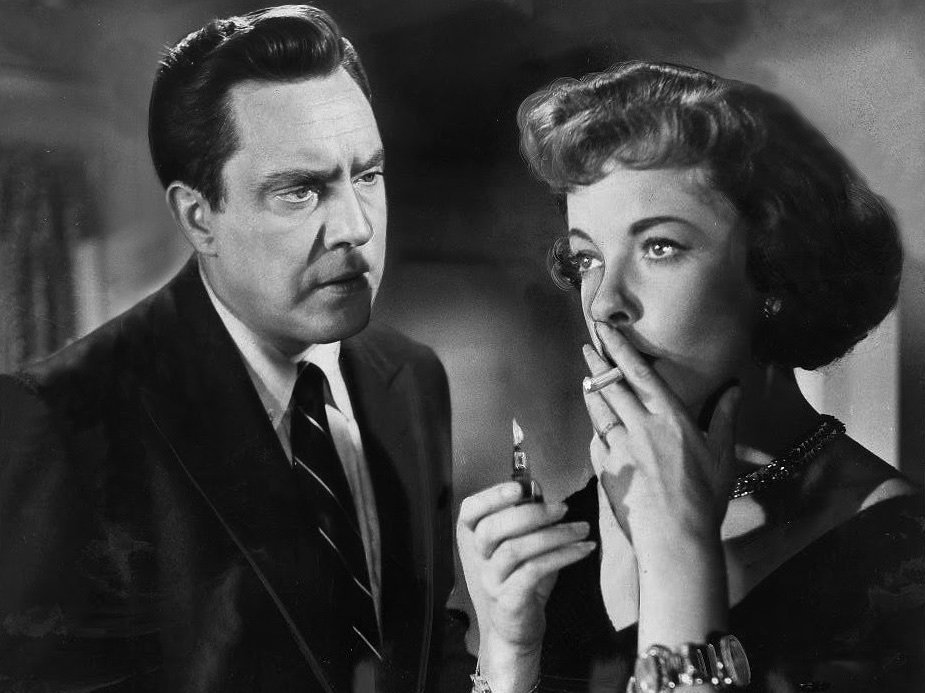Post by Brad Nelson on Jul 7, 2020 20:24:58 GMT -8
The Bigamist.
This 1953 film is interesting if only because it stars Ida Lupino and is directed by Ida Lupino. And she’s done a rather splendid job of it. The story is the story. And I’m not sure how much influence a director has over this. But this is not a ham-fisted effort.
A man (Harry Graham, played by Edmond O’Brien) is married to two women. How did this happen? Obviously he’s some opportunistic sleazebag, a traveling salesman taking advantage of the opportunities he has in long absences from home.
Instead we find an almost reluctant bigamist. His life is slightly Constanzaesque in that he's pulled into it, and gravity seems to work to keep him there:
He doesn’t go looking for trouble. But circumstances nudge him toward Phyllis Martin (Lupino) even though he is already married to Eve Graham (Joan Fontaine). At times, the cool, business-like Eve Graham seems to be doing everything she can to push her man away just when he’s desperately trying to get closer.
And when he does, during one of his frequent prolonged business travels, start to get a bit too close with Phyllis Martin and he's having serious thoughts of just breaking clean, well, again circumstances . . . George said it best:
Edmond O’Briend plays the most likable bigamist ever portrayed on film. In fact, you can’t help but think there should be special exemptions for people such as him. Perhaps some rare people should be able to apply for a bigamist license.
Alas, no such deal is forthcoming for Harry Graham. His double-life comes to light when Santa Claus (Edmund Gwenn) digs into his background as part of his job regarding adoption proceedings. Eve Graham can’t have a child and she’s finally gotten around to deciding that adoption would not only be acceptable but a blessing.
And, of course, her heartfelt quest for a baby comes right at the moment when Harry Graham is about to come straight with his wife and quit living a lie. But his wife is so looking forward to adopting that — you guessed it:

This 1953 film is interesting if only because it stars Ida Lupino and is directed by Ida Lupino. And she’s done a rather splendid job of it. The story is the story. And I’m not sure how much influence a director has over this. But this is not a ham-fisted effort.
A man (Harry Graham, played by Edmond O’Brien) is married to two women. How did this happen? Obviously he’s some opportunistic sleazebag, a traveling salesman taking advantage of the opportunities he has in long absences from home.
Instead we find an almost reluctant bigamist. His life is slightly Constanzaesque in that he's pulled into it, and gravity seems to work to keep him there:
He doesn’t go looking for trouble. But circumstances nudge him toward Phyllis Martin (Lupino) even though he is already married to Eve Graham (Joan Fontaine). At times, the cool, business-like Eve Graham seems to be doing everything she can to push her man away just when he’s desperately trying to get closer.
And when he does, during one of his frequent prolonged business travels, start to get a bit too close with Phyllis Martin and he's having serious thoughts of just breaking clean, well, again circumstances . . . George said it best:
Edmond O’Briend plays the most likable bigamist ever portrayed on film. In fact, you can’t help but think there should be special exemptions for people such as him. Perhaps some rare people should be able to apply for a bigamist license.
Alas, no such deal is forthcoming for Harry Graham. His double-life comes to light when Santa Claus (Edmund Gwenn) digs into his background as part of his job regarding adoption proceedings. Eve Graham can’t have a child and she’s finally gotten around to deciding that adoption would not only be acceptable but a blessing.
And, of course, her heartfelt quest for a baby comes right at the moment when Harry Graham is about to come straight with his wife and quit living a lie. But his wife is so looking forward to adopting that — you guessed it:
So he just can't quite yet set things straight. He can't bring himself to dash her dreams.
The Bigamist is a fun and engaging movie. When you hear the title “The Bigamist” you figure it’s going to be one of those overblown, big, tragic pictures where, of course, the guy (due to almost the requirements of the time) will be all but castrated by the end of the picture.
But Lupino and the writers take a much more nuanced and human approach. Frankly, when you encounter overblown corny movies and wished someone had an ounce of subtlety in their toolbox, this is the kind of movie you wished for.
